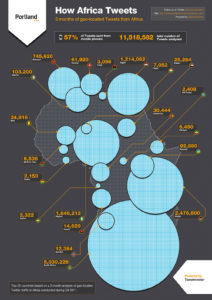 As policymakers, international affairs experts and enthusiasts, we talk a lot here about Africa. But now, those on the African continent are increasingly using tools to make themselves part of the #conversation.
As policymakers, international affairs experts and enthusiasts, we talk a lot here about Africa. But now, those on the African continent are increasingly using tools to make themselves part of the #conversation.
This week, a first-of-its-kind study, “How Africa Tweets” was published by Portland Communications and Tweetminster which examined more than 11.5 million geo-located tweets during the last three months of 2011 and surveyed 500 of Africa’s “Top Tweeters.” For the first time, we have numbers to back up what many of us have assumed anecdotally (with a few surprises), such as:
How much is Twitter used in Africa?
The African country with this highest volume of tweets during the research period was South Africa (5,030,226 tweets) which was more than double the number of tweets of the second and third highest, Kenya (2,476,800 tweets) and Nigeria (1,646,212 tweets). To put these numbers in perspective, there are about 150,000,000 tweets sent every day worldwide.
Who’s using Twitter in Africa?
Those who tweet in Africa tend to be younger—60% between the ages of 21-29, compared with the worldwide average age of 39 years. The study made an interesting observation that Africa’s business and political leaders are largely absent from the continent’s twitterverse. This is a stark contrast to the US where virtually everyone in public political life communicates via Twitter, from political parties, local officials, presidents and presidential candidates (except for Ron Paul.)
Even terrorist networks are taking advantage of social media in Africa, check out my earlier post here.
How is Twitter being used by Africans?
57% of tweets were sent by mobile phones, which is only slightly higher than the 55% worldwide while only 37% of those in the US primarily tweet by mobile phone. (The explosion in mobile penetration in Africa made social media tools much more accessible.) More than 70% of Africans surveyed use Twitter as a source for national and international news. Not surprisingly, nearly 95% of those who use Twitter also use Facebook.
What does this mean?
First, it means that an increasing number of Africans are being exposed to news and information on subjects and from sources they may not have had access to previously. Secondly, we in the US now have a direct means of communication with those in Africa to share ideas, policies and to advocate for peace, change and reform. Thirdly, and I find this really interesting, Africans can talk BACK and share their ideas, concerns and issues. Social Media is a great “equalizer” because it provides a platform to reach millions and millions to those who might not otherwise have the means to communicate on a large scale. Fourthly, and this is what I found MOST interesting, the study revealed that 60% of those on Twitter in Africa “mainly follow African Tweeters.” This means that Africans are not just using new tools to reach “outside”, but they are establishing and strengthening the channels of communications amongst themselves. Now, they can follow world events with commentary from other Africans and gain a perspective that has been virtually absent. Also, strengthening these African-African ties will allow activists across nations to mobilize and coordinate in unprecedented ways.
The study also found that use of Twitter still pales in comparison with the US and other regions of the world. Twitter users in the Middle East and North Africa combined only make up about 5% of the Twitterverse. This disparity is not solely due to economics or access to technology. As the study points out, there are significant security and privacy barriers (particularly for the use of social media tools which incorporate geo-location services.) And how does Twitter’s policy shift this week to allow tweets and accounts to be selectively blocked, depending on the country of access weigh on these trends? Given the clear role that social media played in the Arab Spring, is this a step backwards?
You can download the complete study findings here.